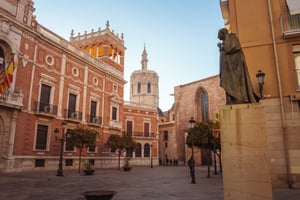A day in the life: Matías Saracusti, far away but always present
What is your job? How would you explain it to a toddler, for example? I am a freelance consultant working for the UN and I specialize in Azure Cloud...
Have a look at the heart of our team, our consultants! We interviewed María to show you how it feels to be a consultant and gain a better understanding of how a day in her life looks life. Get inspired by her experience!
Image by © Anubhav Saxena via Unsplash
Published in Our team

Have you ever been curious about what the daily life of a consultant looks like? What is the routine, what you can expect from a freelance position, or any other doubt about it? We want to dissipate any possible doubt that you might have by diving deeper into one of our collaborator’s routine.
At Ekkiden we are a great group of people who work together, but the beating heart of our activity are the consultants who work hand in hand with us, such as María Amores. She has joined us in this article to tell us about her experience as an IT consultant working for the United Nations.
I am a freelance consultant for the UN at the moment and as I am specialized in Microsoft Dynamics 365, I support them on their IT needs.
This means that my job is to digitalize clients, more like digitalizing their projects. Before I can start doing the real tech job, I have to understand the needs of the client, their vision, so I can create what they have in mind.
First, we start with the discovery phase in which we establish the purpose of the business’ need, why do they need this digitalisation? Then we gather the requirements for that purpose to be fulfilled. Once we have the why and what, we need the how, the structuration of the project.
Once we have the “blueprint” of the project, I build the system, and we integrate it with the partner’s systems. In the end, the digitalisation that we do needs to be able to work smoothly with the pre-existing systems, we need to maintain harmony.
The finishing touch is the adoption phase, in which we work with demos, deliver the training for new users to be familiar with the new system, receive feedback and tweak any possible misalignments.
It is a process that can vary in duration, I have taken part in projects that have been completed in three months and in others that have extended to a two-year period.
Well, I studied Software Engineering, so consulting was of course an option for how the field works.
I have always been interested in volunteering and working with NGOs and for that, being freelance grants you freedom of movement and of choosing the projects that you want to be a part of. I also love travelling, and it is easier to do so when you work freelance.
My goal is to continue gaining experience as a freelance for one day switching to being a manager. I would love to be a project manager who can help others with their struggles and help them solve the challenges they find in their projects. Becoming a manager without any field experience as a consultant is not an option for me. If I become a manager, it is because I know how it feels like to be on the other side, that is how you have the 360 vision.
It is a match, for sure, I have been working with it for nine years now. Ten years ago, CRMs like D365 replaced other databases and systems in use at that moment.
I do work with it because of its versatility. It allows me to provide the service that the causes I want to be helpful for need. For example, you can work with an AI processor, a very in-demand tool currently.
No, we fight every day!
It would be difficult to imagine it as a person, but I think it would be someone shy, you will need to earn their confidence. Once they trust you, and you know them, it would feel like a good friend.
If I encounter a difficulty and what I know is not enough, or I can’t figure out a way to solve it, I ask, everyone. I think that is the power of having a net, friends, and colleagues in the same field you work in. In the non-profit sector, it is common, and people are always willing to give you a hand.
My go-to is to ask, brainstorm, and try to solve it using different perspectives, listening to others who might face it from a different angle than the one I use, but you also must deal with situations in which you can’t solve the problem in the end.
At the moment I have an early start, at 6:00, because of the particular needs of the project I work in, but the task order is the same.
As a freelance, I work from home, so I have flexibility about how to organize my schedule. I tend to meetings first, and I get them out of the way for having time to work without interruptions. I usually stop around 11:00 to have breakfast and give my brain time to rest. My next stop is at lunch, and then I continue until around 16:00. After that, if I don’t have to stay longer because of a bigger workload, it is time for rest, friends or whatever I have in mind.
If I had to choose one, I would say that being overconfident with the demo training preparation. I am used to teaching those, so it doesn’t feel like a big challenge, but I have to remind myself that each of them is different. Typically, they are directed to five or six people, and each project has its own needs and peculiarities.
Even if I struggle with preparing them with time, I do prepare all of them and the worst thing that has ever happened was to get someone’s name wrong, which, if embarrassing, at least it’s not that serious.
The worst thing to deal with is some project managers that treat you like a noob. It is a very specific group of them that don’t listen to you and, even if you are the expert, address you as if it was your first rodeo.
Something else that I don’t really enjoy is when I find programming in projects. In D365 there is not that much programming, so when you have to include some of it or integrate the previous one in your system, you are adding uncertainty and an extra step of modification or replacement.
Microsoft Teams. I can’t believe how we could work before it existed. For me, it is such a complete tool, that conveys all in one. It provides me with everything I need for working and communicating.
I have two. The first one is that you need balance between life and work. My job is important, and I care about it, but some of my friends, my family and everything else that happens outside of work is even more important to me, and it deserves my time and attention.
The second one is a sentence that I have heard a lot and that I don’t agree with. People say that you shouldn't bring your work home but working in non-profits I think it is only human to do so. I work on humanitarian projects, and I think that if I didn’t think about any of it when I closed my laptop, I would feel worse about it. When you work for people’s well-being it is normal and human that it affects you on a personal level when you know they are not okay, but I think it is part of the job, compartmentalising it and only thinking about it when I am working would be too artificial for me.
The project that I am working on with the UN. These kinds of projects have a real impact on people’s lives and in the end, knowing that the product you are working on will help others on a fundamental level is a great motivator.
I moved from London back to Spain and I found the opportunity to work with a consultancy firm that offered me the conditions I was looking for, working for a non-profit and, also, it wasn’t one of the big four, so I took the opportunity.
I like that it is a company in which there is young talent, the business managers treat me well, I feel seen, and they offer me flexibility. I am happy with my choice.
I love spending time with my friends whenever I can. Going out for a drink or to a concert. I enjoy music and I miss the music scene from London but, at the same time, I enjoy spending time in nature too. Going on hikes and getting away from the city is a great feeling.
Now, with a better knowledge of who is María and how she works, we hope that you have a better idea of how we work at Ekkiden. Each of our members is much more than an asset or a talent. We value the human aspect of our consultants and want them to feel at home with us. If you want to know more about our business culture, don’t hesitate to check our career page.
We thank María for her time and honesty and, who knows? Maybe the consultant starring in our next article is you!

What is your job? How would you explain it to a toddler, for example? I am a freelance consultant working for the UN and I specialize in Azure Cloud...

What are your options? While wondering how to start your path as a...

Valencia is a seductive, charming, vibrant, and captivating city that...